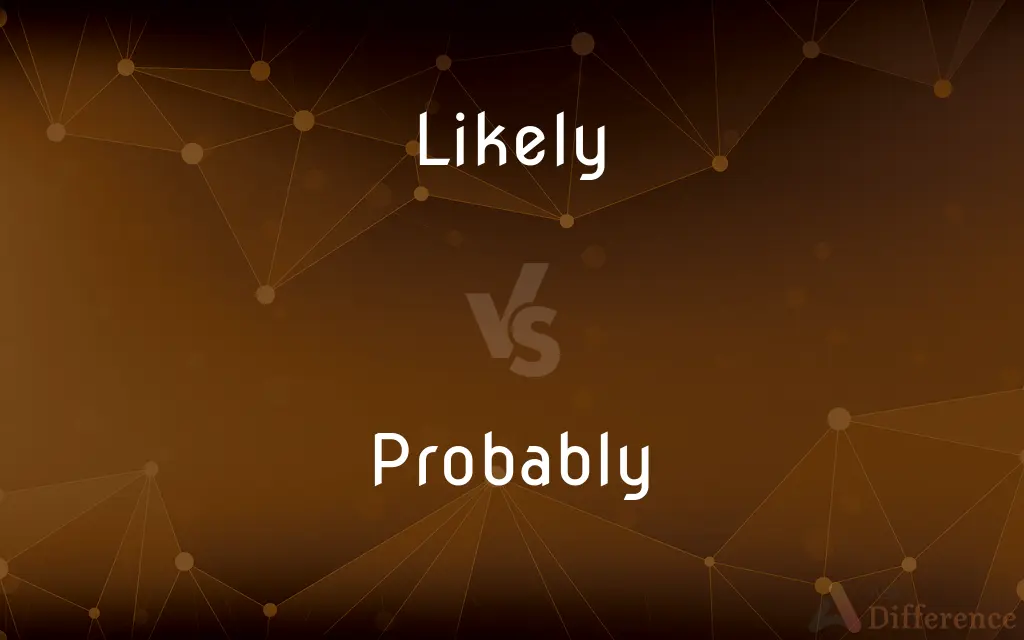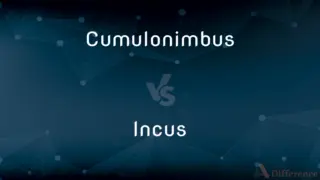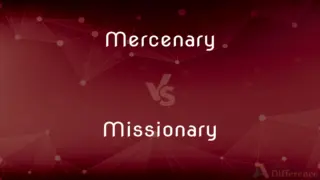Likely vs. Probably — What's the Difference?
By Fiza Rafique & Maham Liaqat — Updated on April 15, 2024
Likely implies a high probability of something occurring, whereas probably suggests a general possibility based on reasoning.

Difference Between Likely and Probably
Table of Contents
ADVERTISEMENT
Key Differences
Likely is used when there is strong evidence or a high chance that something will happen. Whereas probably indicates that something is likely to happen based on available evidence or logical deduction, but with a slightly lower degree of certainty.
In grammar, likely can function as an adjective or an adverb, modifying nouns or verbs to denote expectation. On the other hand, probably serves primarily as an adverb, modifying verbs, adjectives, or other adverbs, emphasizing likelihood.
For predictions, likely tends to be used in more formal or definite contexts, suggesting a stronger expectation. While probably is more commonly used in everyday language, conveying a sense of speculation or conjecture.
In decision making, stating something is likely implies a stronger basis for planning or anticipation. Whereas using probably might suggest a tentative plan based on less certain outcomes.
In terms of nuance, likely often appears in contexts where the outcome can be influenced or assumed based on visible trends or past data. In contrast, probably is typically used when the outcome is guessed based on intuition or incomplete data.
ADVERTISEMENT
Comparison Chart
Part of Speech
Adjective, Adverb
Adverb
Formality
More formal
Less formal
Degree of Certainty
Higher certainty
Lower certainty
Typical Usage
More definitive contexts
More speculative contexts
Influence on Decisions
Strong basis for decisions
Tentative plans based on it
Compare with Definitions
Likely
Probable or expected.
It is likely to rain tomorrow.
Probably
Presumably.
They are probably too busy to notice.
Likely
Having good potential.
She is a likely candidate for the job.
Probably
Indicating likelihood and assumption.
You've probably heard the news.
Likely
Seeming truthful or probable.
A likely story she told us.
Probably
Likely but not assuredly.
He is probably the best choice for the role.
Likely
Suitable or probable in given circumstances.
That is likely the best outcome.
Probably
Used to express probability.
It will probably rain later.
Likely
Such as well might happen or be true; probable
Sales are likely to drop further
It was likely that he would make a televised statement
Speculation on the likely effect of opting out
Probably
Very likely but not certain.
She will probably join us later.
Likely
Apparently suitable; promising
A likely-looking spot
Probably
Most likely; presumably.
Likely
Probably
We will most likely go to a bar
Probably
In all likelihood.
Likely
Possessing or displaying the qualities or characteristics that make something probable
They are likely to become angry with him. See Usage Note at liable.
Probably
In a probable manner; in likelihood.
Distinguish between what may possibly and what will probably be done.
Likely
Within the realm of credibility; plausible
Not a very likely excuse.
Probably
With considerable certainty; without much doubt;
He is probably out of the country
In all likelihood we are headed for war
Likely
Apparently appropriate or suitable
There were several likely candidates for the job.
Probably
Easy to believe on the basis of available evidence;
He talked plausibly before the committee
He will probably win the election
Likely
Apt to achieve success or yield a desired outcome; promising
A likely topic for investigation.
Likely
Attractive; pleasant
Found a likely spot under a shady tree for the picnic.
Likely
Probably
They'll likely buy a new car soon.
Likely
Probable; having a greater-than-even chance of occurring
Rain is likely later this afternoon.
Likely
Reasonably to be expected; apparently destined, probable
They are likely to become angry with him.
He is likely to succeed at anything he tries.
Likely
Appropriate, suitable; believable; having a good potential
Jones is a likely candidate for management.
Likely
Plausible; within the realm of credibility
Not a very likely excuse.
Likely
Promising; apt to achieve success or yield a desired outcome
A likely topic for investigation.
Likely
Attractive; pleasant
I found a likely spot under a shady tree for the picnic.
Likely
(obsolete) Similar; like; alike.
Likely
Something or somebody considered likely.
Likely
(obsolete) Similarly.
Likely
Probably.
Likely he’ll win the election in this economy.
Likely
Worthy of belief; probable; credible; as, a likely story.
It seems likely that he was in hope of being busy and conspicuous.
Likely
Having probability; having or giving reason to expect; - followed by the infinitive; as, it is likely to rain.
Likely
Similar; like; alike.
Likely
Such as suits; good-looking; pleasing; agreeable; handsome.
Likely
Having such qualities as make success probable; well adapted to the place; promising; as, a likely young man; a likely servant.
Likely
Improbable; unlikely; - used ironically; as, a likely story.
Likely
In all probability; probably.
While man was innocent he was likely ignorant of nothing that imported him to know.
Likely
Has a good chance of being the case or of coming about;
These services are likely to be available to us all before long
She is likely to forget
A likely place for a restaurant
The broken limb is likely to fall
Rain is likely
A likely topic for investigation
Likely candidates for the job
Likely
Likely but not certain to be or become true or real;
A likely result
He foresaw a probable loss
Likely
Expected to become or be; in prospect;
Potential clients
Expected income
Likely
Within the realm of credibility;
Not a very likely excuse
A plausible story
Likely
With considerable certainty; without much doubt;
He is probably out of the country
In all likelihood we are headed for war
Common Curiosities
What is the subtle difference in certainty between likely and probably?
Likely conveys a higher degree of certainty compared to probably, which suggests a general but less assured possibility.
Can 'probably' modify an adjective? Give an example.
Yes, "probably" can modify an adjective. For example, "That is probably impossible at this stage."
Is it correct to say, "It is likely probably going to rain"?
No, it is not standard to combine "likely" and "probably" in this way because it creates redundancy in expression of probability.
What are some synonyms for 'probably'?
Synonyms for 'probably' include possibly, perhaps, and maybe.
In what contexts is 'likely' inappropriate or less preferred?
'Likely' is less preferred in contexts where uncertainty is emphasized more than probability, such as in speculative discussions.
How does the use of likely differ in formal and informal contexts?
Likely is more often used in formal contexts with a stronger implication of certainty than in informal ones.
What does likely mean in a sentence?
In a sentence, likely indicates a high probability of something occurring.
Can probably be used as an adjective?
No, probably is used as an adverb, not as an adjective.
Is 'likely' used more in British or American English?
"Likely" is commonly used in both British and American English without significant variation in usage.
What are some synonyms for 'likely'?
Synonyms for 'likely' include probable, plausible, and feasible.
Can 'likely' be used as a standalone response? Provide an example.
Yes, 'likely' can be used as a standalone response. For example, in response to "Will it rain today?" one might say, "Likely," implying a high chance of rain.
Can 'likely' and 'probably' be used interchangeably in predictions?
While they can sometimes be used interchangeably, 'likely' often suggests a stronger degree of certainty than 'probably' in predictions.
How does the use of 'likely' in legal or scientific texts differ from everyday usage?
In legal or scientific texts, 'likely' is used to convey a more definitive and often quantifiable probability, whereas in everyday usage, it might not carry such precise implications.
How does 'probably' affect the tone of a statement?
Using 'probably' softens the tone of a statement, introducing a sense of uncertainty or less assertiveness.
What impact does starting a sentence with 'probably' have on its clarity?
Starting a sentence with 'probably' can make the statement appear less decisive and more tentative.
Share Your Discovery

Previous Comparison
Cumulonimbus vs. Incus
Next Comparison
Mercenary vs. MissionaryAuthor Spotlight
Written by
Fiza RafiqueFiza Rafique is a skilled content writer at AskDifference.com, where she meticulously refines and enhances written pieces. Drawing from her vast editorial expertise, Fiza ensures clarity, accuracy, and precision in every article. Passionate about language, she continually seeks to elevate the quality of content for readers worldwide.
Co-written by
Maham Liaqat














































